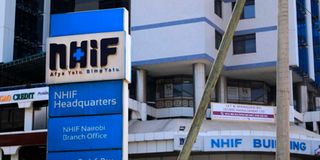NHIF: Inactive cover for TB patients to be restored

The National Health Insurance Fund building in Nairobi.
The National Health Insurance Fund (NHIF) has attributed the inability to submit the names to the fund to why the coverage for patients with drug-resistant TB was not activated.
Patients have claimed that despite Global Fund paying, the cover for 800 patients had yet to be activated dating back to April 2020.
According to Evelyn Kibuchi, the Stop TB Partnership Kenya's national coordinator, all patients diagnosed with drug-resistant TB are covered by the National Health Insurance Fund on the day the Global Fund confirms their drug resistance.
"Since April 2020, we have had patients whose NHIF payments had been made but the cover has not been activated meaning the patient will have to pay out of pocket for the cost of treating their illness," said Ms Kibuchi.
“It is very unfortunate because the patient is made even poorer by paying out of pocket for admission, tests, and medications to treat some side effects of these treatments.”
NHIF CEO Peter Kamunyo acknowledged that he was aware of the issue and that the relevant department would handle the matter.
“The names of those people must be forwarded annually, and that is where there was a little hiccup in terms of these specific individuals. With the help of our department of beneficiary management, we will deal with that issue," said Dr Kamunyo, responding to queries by the National Health Committee on Thursday.
Once identified, the names will then be forwarded to the relevant departments at the Ministry of Health to ensure such a lapse does not occur again.
Drug-resistant tuberculosis (DR-TB) is a form of antimicrobial resistance that is difficult and costly to treat.
It is caused by TB bacteria resistant to at least one of the first-line existing TB medications, resulting in fewer treatment options and increasing mortality rates.
According to the World Health Organization (WHO), people with drug-resistant TB face significant economic and social costs, and only 1 in 3 access quality care.





